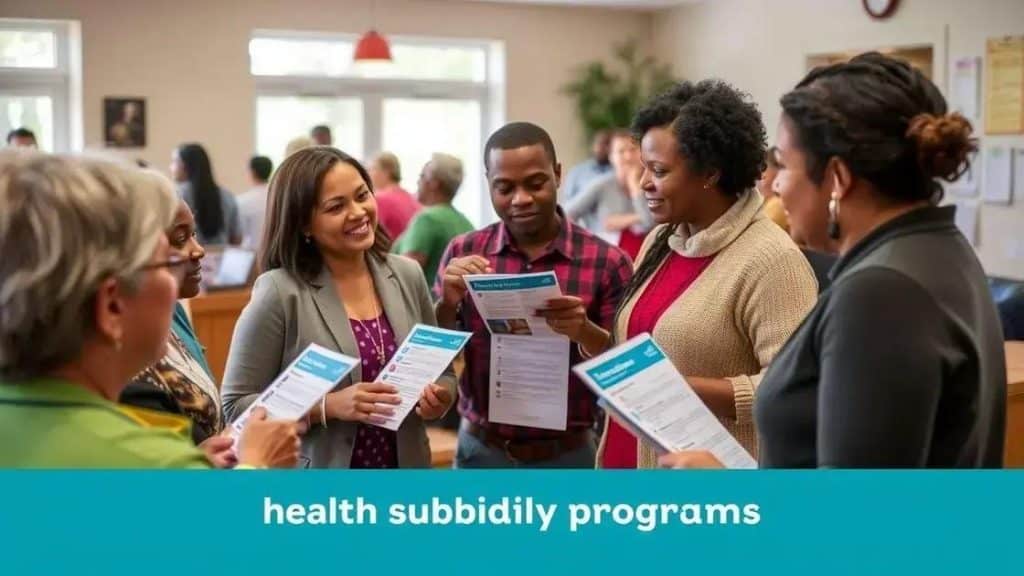Reason health subsidy programs: Are they worth it?

Health subsidy programs provide essential financial assistance to individuals seeking affordable medical care, significantly improving access to healthcare services for low-income families and vulnerable populations.
Reason health subsidy programs play a crucial role in supporting individuals with their medical expenses. If you’ve ever wondered how these programs can affect your health costs, you’re not alone. Let’s delve into their significance and explore how they might benefit you.
Understanding health subsidy programs
Understanding health subsidy programs can open doors to better healthcare options. These programs are designed to assist individuals who struggle to pay for medical expenses. Knowing how they work is crucial for anyone looking to benefit from them.
What Are Health Subsidy Programs?
Health subsidy programs provide financial assistance for medical costs. They often target low-income families or individuals. By helping cover health-related expenses, these programs can significantly reduce financial stress.
Types of Health Subsidy Programs
- Government-funded programs offer assistance based on income.
- Employer-sponsored health plans provide benefits to employees.
- Non-profit organizations may offer grants for specific health needs.
- State-specific programs can vary greatly in terms of eligibility and benefits.
It’s important to compare different options. When you explore health subsidy programs, think about your specific needs and financial situation. You might find that certain programs align more closely with your requirements. For instance, some aim to help those with chronic conditions, while others may focus on preventative care.
Applying for health subsidies can seem challenging at times. However, understanding the eligibility criteria can make this process easier. Most programs will require documentation of income and household size. Be prepared with this information to streamline your application.
Who Can Benefit from These Programs?
Many groups can take advantage of health subsidy programs. These include low-income families, the elderly, and even the unemployed. If you or someone you know falls into one of these categories, you may want to look into available options.
- Low-income families often struggle with healthcare costs, making subsidies essential.
- The elderly benefit from reduced medication costs and healthcare services.
- The unemployed can access coverage during tough financial times.
Understanding these aspects can empower you and guide your healthcare decisions. By taking advantage of the right programs, you can improve your health outcomes without the financial burden.
The benefits of health subsidies for individuals
The benefits of health subsidies for individuals are significant and far-reaching. These programs can help offset the high costs of medical care, making essential services more accessible. When you have financial assistance, it can alleviate some of the stress associated with healthcare expenses.
Improved Access to Medical Services
One of the primary advantages of health subsidies is the improved access to medical services. With subsidies helping to cover costs, individuals are more likely to seek necessary care. This means people can visit their doctors for regular check-ups and preventative care without worrying about the cost.
Lower Out-of-Pocket Expenses
- Health subsidies reduce the amount individuals have to pay out of pocket.
- They make essential medications more affordable.
- Individuals can manage their chronic conditions better.
- Subsidies allow for participation in necessary health programs.
When out-of-pocket expenses are lower, individuals can allocate their finances to other needs, creating a more balanced financial situation. It also means they can afford to invest in healthier lifestyle choices, as healthcare is less burdensome on their wallets.
Enhanced Quality of Life
With the assistance of health subsidies, individuals can experience an enhanced quality of life. Reduced financial pressure allows people to focus on their health and well-being without the constant worry of bills. As a result, they may feel more empowered to make healthier lifestyle choices.
Moreover, having access to preventative care can lead to early detection of health issues, which can significantly improve long-term outcomes. This proactive approach to health care helps individuals maintain better health and avoid more serious medical problems down the road.
Support for Vulnerable Populations
Vulnerable populations, including the elderly and low-income families, benefit greatly from health subsidies. These groups often face the highest challenges regarding healthcare access. By providing financial support, these programs ensure that everyone has the opportunity to receive proper care, regardless of their financial situation.
How to apply for health subsidy programs

Applying for health subsidy programs is a process that can seem daunting, but it’s essential for accessing much-needed financial support for healthcare costs. Understanding the steps involved can simplify the journey.
Gather Required Information
Before starting your application, gather all necessary information. This typically includes identification documents, proof of income, and information about your household size. Having these documents ready can make the application process smoother and faster.
Check Eligibility Criteria
- Each program has different eligibility requirements.
- Often, these are based on income and household size.
- Some programs may prioritize specific groups, like seniors or low-income families.
- Review the guidelines carefully to ensure you qualify before applying.
Once you’re sure about your eligibility, it’s time to fill out the application. Most applications allow you to provide your information either online or through paper forms. If applying online, look for official websites to avoid scams.
Complete the Application
Fill out the application as accurately as possible. Take your time to ensure that all the information is correct. Mistakes can lead to delays or denial of assistance. After you submit your application, keep a copy for your records.
After applying, be prepared for a wait as the reviewing process can take time. During this period, you might need to provide additional information or documentation. Be responsive to any requests from the program to avoid delays.
Follow Up
Don’t hesitate to follow up on your application status. Many programs provide a way to check your application online or by phone. Keeping track of your application ensures you stay informed about any updates or required actions.
By understanding how to apply for health subsidy programs, you’re taking an important step towards accessing necessary healthcare support. Don’t let the process intimidate you; the rewards are worth the effort.
Challenges in accessing health subsidy programs
Accessing health subsidy programs can present several challenges that individuals may face. Understanding these hurdles is essential for overcoming them and gaining the assistance needed for medical costs.
Complex Application Processes
One significant challenge is the complexity of the application process. Many potential applicants may find the paperwork overwhelming. The language used in applications can be technical and confusing, making it hard for individuals to understand what information is needed.
Eligibility Requirements
- Eligibility criteria can be strict and vary by program.
- Some individuals may not meet the necessary income thresholds.
- Documentation requirements can be burdensome.
- Time limits for applications often add additional pressure.
Individuals might feel discouraged when they see these requirements. They may believe that they do not qualify or worry they won’t provide the right documents, which can lead to missed opportunities for support.
Lack of Awareness
Another key challenge is the lack of awareness about available health subsidy programs. Many people do not know these resources exist or how to find them. Community outreach and educational resources are essential to spread awareness and inform potential applicants about the programs they may qualify for.
Language Barriers
- Language differences can impede understanding of the application process.
- Individuals may require translation assistance.
- Resources in multiple languages are often limited.
- Lack of support in native languages can prevent access to helpful information.
For non-English speakers, navigating the system can be even more challenging. There is a need for multilingual support and resources to ensure that everyone has equal access to healthcare subsidies.
Systems and Technology Issues
Technical issues with online applications can also pose a challenge. Individuals might encounter problems with websites or online forms that are not user-friendly. This can lead to frustration and abandoned applications, leaving many without the help they need.
Overall, while health subsidy programs offer significant benefits, addressing these challenges is vital for improving access and fostering a more inclusive system for individuals seeking help.
Future of health subsidy programs in healthcare
The future of health subsidy programs in healthcare looks promising, with potential advancements that can enhance access to medical care for countless individuals. These programs are continually evolving to meet the changing needs of society.
Technological Advancements
One of the most significant factors shaping the future of health subsidies is technology. Digital tools can simplify the application process, making it more user-friendly. Mobile apps and online platforms will likely become common, allowing people to apply for assistance with just a few clicks.
Increased Awareness and Outreach
- There will be more efforts to increase public awareness of available programs.
- Community outreach initiatives can provide education on eligibility and access.
- Partnerships with local organizations will help connect individuals with resources.
- Information in multiple languages can broaden access to diverse populations.
These efforts can ensure that more people know about the assistance available to them, leading to higher participation rates in health subsidy programs.
Policy Changes
Changes in government policy will also play a crucial role in the future of health subsidy programs. As policymakers recognize the importance of healthcare access, they may increase funding and expand eligibility criteria. This could lead to more comprehensive support for a wider range of individuals.
Focus on Preventative Care
- Future programs may emphasize preventative care to reduce long-term costs.
- Subsidies could support wellness programs and regular check-ups.
- Investing in preventative health can help mitigate serious health issues before they arise.
- This shift can improve the overall health of communities and reduce strain on healthcare systems.
By focusing on prevention, health subsidy programs can encourage healthier lifestyles and better management of chronic conditions.
Collaborative Approaches
Future health subsidy programs may adopt more collaborative approaches, working with healthcare providers, insurance companies, and community organizations. By creating a network of support, these programs can address various needs and provide more integrated care.
Overall, the outlook for health subsidy programs is bright. Through innovation and increased awareness, they can evolve to better serve populations, ensuring more individuals access the healthcare they deserve.
FAQ – Frequently Asked Questions about Health Subsidy Programs
What are health subsidy programs?
Health subsidy programs provide financial assistance for medical expenses, helping individuals afford necessary healthcare services.
Who can apply for health subsidy programs?
Typically, low-income families, seniors, and individuals facing financial hardships can apply, but eligibility varies by program.
How do I apply for health subsidy programs?
To apply, gather required documents like proof of income and complete the application, either online or in person, depending on the program.
What challenges might I face when applying?
Common challenges include complex applications, strict eligibility criteria, and a lack of awareness about available programs.





